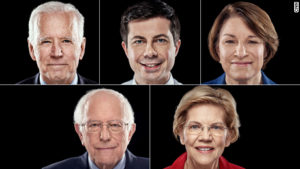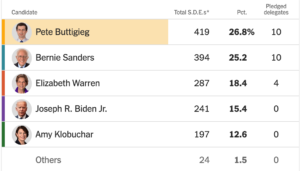
There were only five candidates that secured over 1 percent if the votes. Photo courtesy of CNN.
After almost a year of campaigning and seven debates, the first votes of the 2020 primary season were made Feb. 3 in Iowa. However, only 71 percent of the precincts have been released by the Iowa Democratic Party as of Tuesday evening, Feb. 4.
Former South Bend Mayor Pete Buttigieg is ahead of Senator Bernie Sanders by 1.6 percentage points with 26.8 percent to Sander’s 25.2 percent. Senator Elizabeth Warren is currently third with 18.4 percent followed by former Vice President Joe Biden with 15.4 percent and finally Senator Amy Klobuchar with 12.6 percent.

Results from the Iowa caucus with 71 percent of precincts reported. Graph courtesy of The New York Times.
The delay in results was caused by a new app the Democratic party used. CNN has reported that the app was supposed to streamline reporting, but the opposite happened. This might be an indication of what could happen in the primaries in other states if the same app is used.
The push for a more efficient system comes from historically lengthy caucuses, especially when compared to primaries.
A caucus begins with an open debate with people trying to convince others to vote for their candidate. Following the discussions, there are two rounds of voting. During the first round of voting, people will go to different areas of the room that represent the candidate they support. The candidate must have at least 15 percent of the voters after the first round for those votes to be valid. If the candidate is at or over 15 percent then those votes are locked in. In the second round of voting, the people who supported a candidate that did not receive enough to pass the threshold will have to support one of the remaining options. Those numbers are then recorded and sent to the Democratic party.
Iowa, Nevada, and Wyoming are the only states that use a caucus system to determine which candidate receives their delegates.
Over the next three weeks, Nevada will hold their caucus, and New Hampshire and South Carolina will be holding their primaries.
Julian Castro, former Democratic presidential candidate, has publicly criticized the primary schedule for the lack of diversity in the early states. “[Iowa and New Hampshire] are not reflective of the diversity of our country, and certainly not reflective of the Democratic Party,” the now surrogate of Elizabeth Warren said.
According to U.S. Census population estimates in 2018, Iowa and New Hampshire both have over 85 percent white population. The first instances of diversity come from Nevada with a 29 percent Hispanic/Latino population and South Carolina with a 26.6 percent African American population.
In the past, Iowa and New Hampshire have been spotty when predicting the presidency. With that being said, NPR reported that in the last 40 years just one person has gone on to win the presidency after losing both Iowa and New Hampshire — Bill Clinton.
The elephant, or should I say billionaire, in the room is former New York City Mayor Michael Bloomberg who is not registered on any state ballot until Super Tuesday on March 3. According to FiveThirtyEight, Bloomberg is averaging 8.6 percent at the national level. We may also see the businessman on the next debate stage on Feb. 19 following the Democratic Party removing the grassroots funding support threshold.
The next pitstop for candidates is the New Hampshire primary on Tuesday, Feb. 11 with many polls suggesting an easy night for Bernie.
The Western Carolina Journalist will continue with national and local election coverage throughout the year.


